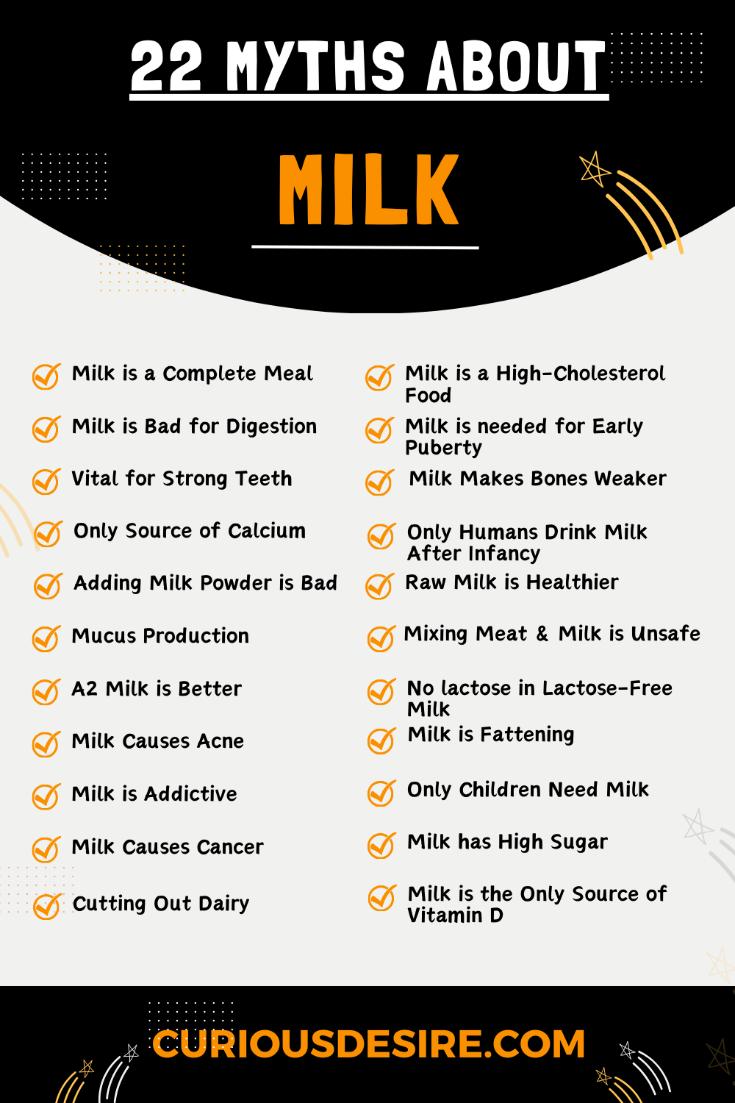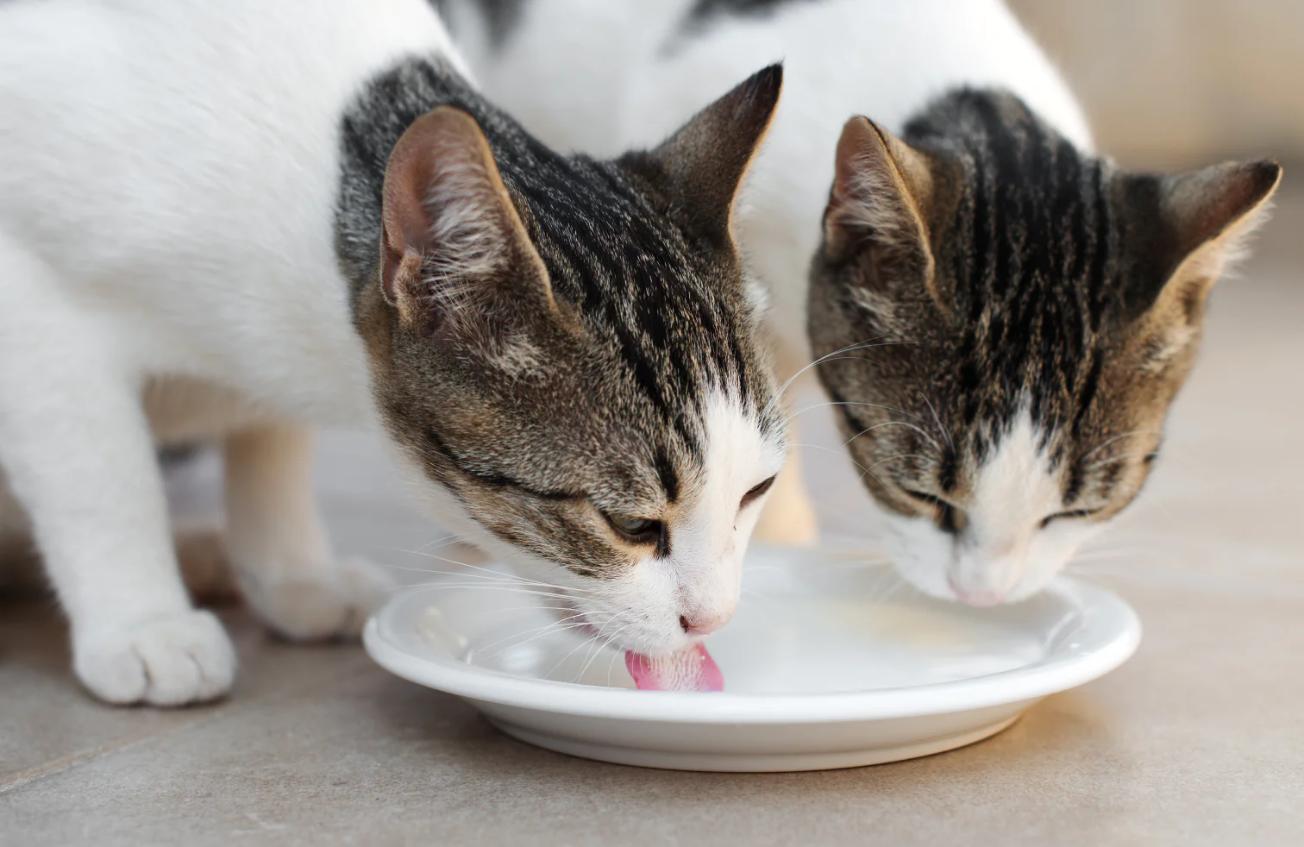Milk, a staple in many diets worldwide, has been surrounded by a myriad of beliefs, some rooted in tradition and others in scientific inquiry.
In this exploration, we explore certain common myths about milk— misconceptions that have persisted through time.
Here are the 5 Most Common Myths About Milk:
[toc]

Myth 1: Milk is a Complete Meal
Why This Myth Exists:
The notion that milk constitutes a complete meal likely arises from its rich nutritional content, encompassing proteins, fats, vitamins, and minerals.
Debunking the Myth:
Contrary to the belief that milk is a standalone meal, it lacks the diverse array of nutrients present in a balanced, whole-food-based meal.
While milk contributes essential elements, relying solely on it overlooks the importance of incorporating a variety of food groups to meet the body’s diverse nutritional needs.
Myth 2: High Cholesterol In Milk
Why This Myth Exists:
The misconception that milk is high in cholesterol likely originates from the association between saturated fats and cholesterol.
Historical dietary guidelines that vilified saturated fats might contribute to the belief that milk, containing both saturated and unsaturated fats, is cholesterol-laden.
Debunk the Myth
Scientific understanding has evolved, revealing that the impact of dietary cholesterol on blood cholesterol levels is more nuanced.
While milk does contain saturated fats, moderate consumption as part of a balanced diet is not a significant contributor to adverse cholesterol profiles.
Myth 3: Bad for Digestion
Why This Myth Exists:
The belief that milk is detrimental to digestion could be linked to lactose intolerance, causing discomfort in some individuals.
Personal anecdotes and cultural narratives might contribute to the perception that milk universally hinders digestive processes.
Debunk the Myth:
While lactose intolerance can lead to digestive issues for some, many people tolerate milk well.
Lactose-free alternatives and other dairy products cater to individuals with sensitivities, and the impact on digestion varies widely among individuals.
Myth 4: Responsible for Early Puberty
Why This Myth Exists:
The misconception associating milk with early puberty might stem from a simplified cause-and-effect understanding of dietary influences on hormonal development.
Debunk the Myth:
Scientific evidence does not strongly support the idea that milk consumption directly triggers early puberty.
Puberty onset is a complex biological process influenced by various factors, and dietary choices are just one piece of the puzzle.
Myth 5: Drinking Milk is Necessary for Strong Teeth
Why This Myth Exists:
The belief that milk is indispensable for strong teeth likely originates from its calcium content, essential for dental health.
Debunk the Myth:
While calcium is crucial for dental health, relying solely on milk overlooks the multifaceted nature of oral care.
Good oral hygiene practices, including regular brushing and flossing, along with a balanced diet, contribute collectively to maintaining strong teeth.
Myth 6: Bones Are Weakened by Milk
Why This Myth Exists:
Some people think that drinking a lot of milk can make your bones weak. They might have seen that people who drink a lot of milk also have problems with their bones.
Debunk the Myth:
Adequate calcium intake, including from milk, is crucial for maintaining strong bones. However, bone health is influenced by various factors, including physical activity and overall diet.
Milk, when part of a balanced diet, contributes positively to bone strength.
Myth 7: Calcium Can Only be Obtained From Milk
Why This Myth Exists:
Milk is the exclusive source of calcium may stem from historical dietary patterns or marketing emphasizing milk’s role in meeting calcium needs.
Limited awareness of other calcium-rich foods might contribute to this perception.
Debunk the Myth:
While milk is a convenient and rich source of calcium, various foods such as leafy greens, fortified products, and certain fish also provide this essential mineral.
Diversifying one’s diet ensures a broader intake of nutrients beyond what milk alone can offer.
Myth 8: Humans are the Only Species that Consume Milk Beyond Infancy
Why This Myth Exists:
The idea that humans are unique in consuming milk beyond infancy might arise from a human-centric perspective, overlooking instances of lactase persistence in certain mammals.
Debunk the Myth:
Some mammals exhibit lactase persistence, allowing them to digest milk sugars into adulthood.
This challenges the notion that extended milk consumption is exclusive to humans.
Myth 9: Adding Milk Powder is a Bad Practice
Why This Myth Exists:
Adding milk powder is undesirable and may be linked to concerns about processed foods or perceptions of milk powder as an unnatural or inferior form of milk.
Debunk the Myth:
Milk powder is a concentrated form of milk that serves various purposes in the dairy industry, contributing to standardization and consistency in products.
When used appropriately, milk powder enhances the quality of dairy items without inherently compromising their nutritional value.
Myth 10: Raw Milk is Healthier than Pasteurized Milk
Why This Myth Exists:
Some people are drawn to the idea of consuming foods in their natural state, without processing.
Raw milk proponents argue that pasteurization, a process of heating to kill harmful bacteria, destroys beneficial enzymes and nutrients naturally present in milk.
Debunk the Myth:
Pasteurization is a critical process that eliminates harmful bacteria, making milk safe for consumption.
Consuming raw milk poses unnecessary health risks, and pasteurized milk retains its nutritional benefits while ensuring safety.
Myth 11: Milk Causes Mucus Production
Why This Myth Exists:
This idea may be rooted in personal experiences or cultural beliefs. Anecdotal observations of increased mucus after consuming milk could contribute to the widespread acceptance of this myth.
Debunk the Myth:
Scientifically, there is limited evidence supporting a direct link between milk consumption and heightened mucus production.
While individual responses may vary, the overall impact on mucus production is not well-established.
Myth 12: Mixing Meat and Milk is Unsafe
Why This Myth Exists:
Some cultures historically separated meat and dairy due to concerns about food safety.
Before modern food safety practices and refrigeration, there has been a practical reason to avoid combining perishable meat and dairy to prevent spoilage or contamination.
Debunk the Myth:
With modern food safety practices, the combination of meat and milk is generally safe.
While individual dietary restrictions based on cultural or religious beliefs may persist, the overall safety of combining these food items has improved with advancements in food handling and storage.
Myth 13: A2 Milk is Significantly Better than A1 Milk
Why This Myth Exists:
A2 milk is superior to A1 milk, this idea may be rooted in the perception that A2 milk, containing a different protein variant, is more easily digestible.
Marketing strategies and anecdotal claims might also contribute to this belief.
Debunk the Myth:
Scientific research does not provide conclusive evidence that A2 milk offers significant health benefits over A1 milk.
The impact on digestion varies among individuals, and the overall nutritional differences between A1 and A2 milk are not substantial enough to warrant a categorical preference.
Myth 14: Lactose-Free Milk is Completely Lactose-Free
Why This Myth Exists:
This myth that lactose-free milk is entirely devoid of lactose may result from a misunderstanding of the lactose-free labeling.
Individuals may assume complete elimination of lactose, which is not the case.
Debunk the Myth:
Lactose-free milk undergoes a process where lactase is added to break down lactose, making it more digestible for individuals with lactose intolerance.
However, it still contains residual lactose, and while generally well-tolerated, complete lactose absence is not achieved.
Myth 15: Milk Causes Acne
Why This Myth Exists:
The connection between milk and acne may be rooted in anecdotal observations or misinterpretations of personal experiences.
Associations between diet and skin health, coupled with historical beliefs, could contribute to this myth.
Debunk the Myth:
Scientific evidence on the link between milk consumption and acne is inconclusive.
While individual responses to dairy can vary, attributing acne solely to milk oversimplifies the multifactorial nature of skin health, including genetic, hormonal, and dietary factors.
Myth 16: Milk is Fattening and Should be Avoided for Weight Loss
Why This Myth Exists:
The misconception that milk is fattening and counterproductive for weight loss may be influenced by historical dietary trends associating fat consumption with weight gain.
Perceptions of high-calorie content in milk might contribute to this belief.
Debunk the Myth:
Milk offers various options, including low-fat and skim varieties, which can be part of a balanced diet conducive to weight management.
Moderation and choosing appropriate milk options align with overall health goals without necessitating complete avoidance.
Myth 17: Addictive Nature of Milk
Why This Myth Exists:
Milk contains a protein called casein, which, when broken down during digestion, produces peptides known as casomorphins.
Casomorphins have opioid-like properties, leading to the suggestion that they might be addictive.
Debunk the Myth:
the concentrations of casomorphins in milk are much lower than those found in substances with known addictive properties.
Likewise, the physiological effects of casomorphins in the human body are far milder than those of highly addictive substances.
Myth 18: Only Children Need to Drink Milk
Why This Myth Exists:
The belief that only children require milk might be influenced by historical dietary guidelines emphasizing the importance of milk in childhood development.
Limited awareness of the continued nutritional benefits of milk in adulthood could contribute to this perception.
Debunk the Myth:
Milk provides essential nutrients beneficial for individuals of all ages, contributing to bone health and overall well-being.
While dietary needs vary, adults can also derive nutritional advantages from incorporating milk into their balanced diet.
Myth 19: Cancer Can be Caused by Milk
Why This Myth Exists:
Milk contains hormones, such as insulin-like growth factor 1 (IGF-1), which plays a role in growth and development.
Some studies have explored potential links between elevated IGF-1 levels and cancer, leading to concerns about the impact of milk consumption.
Debunk the Myth:
Scientific evidence on the relationship between milk consumption and cancer risk is inconclusive and varies among studies.
While ongoing research explores these connections, current knowledge does not establish a direct link between moderate milk consumption and an increased risk of cancer.
Myth 20: Milk is a High-Sugar Beverage
Why This Myth Exists:
The belief that milk is a high-sugar beverage may arise from concerns about sugar intake and a misunderstanding of lactose as an added sweetener.
Historical dietary trends associating milk with excessive sugar consumption might contribute to this perception.
Debunk the Myth:
While milk contains lactose, a natural sugar, it is not classified as a high-sugar beverage.
The naturally occurring sugars in milk come with essential nutrients, and moderate consumption aligns with a balanced diet.
Myth 21: You Lose Weight by Cutting Out Dairy
Why This Myth Exists:
Some individuals may view dairy products as high in calories and fat, associating them with weight gain.
Debunk the Myth:
Weight management involves overall dietary patterns, caloric intake, and lifestyle choices.
While reducing calorie consumption may contribute to weight loss, eliminating an entire food group, such as dairy, is not a sustainable or recommended approach for achieving and maintaining a healthy weight.
Myth 22: Milk is the Only Source of Vitamin D
Why This Myth Exists:
In many countries, milk has been a primary target for Vitamin D fortification campaigns.
This practice began in the early 20th century to address vitamin deficiencies, especially rickets.
The association of Vitamin D with milk became ingrained in public perception, contributing to the belief that milk is the sole source of this vitamin.
Debunk the Myth:
While milk is often fortified with vitamin D, obtaining this crucial nutrient from various sources, such as sunlight exposure and certain fortified foods, ensures a more comprehensive and balanced approach to meeting dietary needs.
Diversifying dietary sources enhances overall nutritional intake.
Milk Myths FAQs
1. Did you know the facts about milk?
Milk is an excellent source of essential nutrients such as calcium, vitamin D, and protein. It plays a crucial role in bone health and overall nutrition.
2. How does milk affect your life?
Milk contributes to a balanced diet, providing essential nutrients for bone health, growth, and overall well-being. It is a versatile ingredient used in various cuisines and is a staple in many households.
3. What is special about milk?
Milk is special for its nutritional richness, containing a variety of vitamins and minerals. It is also a complete protein source, meaning it provides all essential amino acids.
4. Why did the first person drink milk?
The exact reasons are not known, but it’s likely that early humans discovered the nutritional value of milk by observing and imitating animals.
Milk provided a convenient source of nutrition.
5. Who first milked a cow?
The first person to milk a cow is not specifically documented, as it likely occurred in prehistoric times.
Milking animals for their milk became a practice as humans transitioned from nomadic lifestyles to settled agricultural communities.
6. Are humans originally supposed to drink milk?
Originally, humans were not adapted to drink milk beyond infancy. Lactase persistence, the ability to digest lactose in milk, is a genetic adaptation that develops in certain populations over time.
7. Can humans digest cow milk?
Many humans can digest cow milk, but lactose intolerance is common in some populations. Lactose-intolerant individuals lack the enzyme lactase, necessary to break down lactose, the sugar in milk.
8. Why don’t adults drink human milk?
Drinking human milk beyond infancy is not a cultural norm, and it may be due to social, ethical, and practical reasons. Additionally, adults do not require the same nutrients found in breast milk.
9. Who decided to drink milk first?
The decision to drink milk likely evolved over time through observation and necessity. Early humans may have imitated animals that were known to provide nourishing milk.
10. Who drank milk for the first time?
The first instances of milk consumption are lost in prehistoric times. It likely occurred independently in different regions as humans domesticated animals.
11. When did humans first have milk?
The exact timeframe is uncertain, but evidence suggests that milk consumption began with the domestication of animals, around 10,000 years ago during the Neolithic Revolution.
12. Is milk good for your bones a myth?
No, it’s not a myth. Milk is a good source of calcium and vitamin D, essential for bone health. However, a balanced diet and other factors also contribute to bone health.
13. Why is milk bad for adults?
Milk is not inherently bad for adults. However, some individuals may be lactose intolerant, and excessive consumption may lead to health issues. Moderation is key.
14. Does milk make your bones weaker?
No, milk does not make bones weaker. In fact, milk is a source of nutrients like calcium and vitamin D, which are crucial for maintaining strong and healthy bones.


